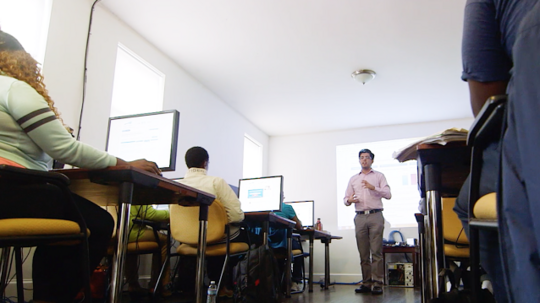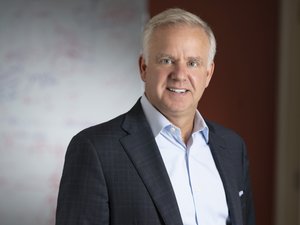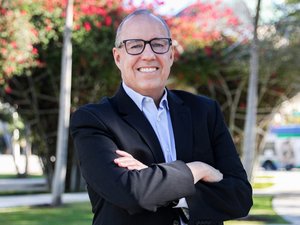
Elizabeth Lindsey was doing some shopping in Columbia Heights when she saw a sign for Chick-fil-a. It said - now hiring, apply online.
It's a fairly innocuous sign, but Lindsey sees a problem. To her, it says - to apply for this entry-level job at a fast food restaurant, you must have access to a computer with internet connection and be able to navigate to the page, type up your information and input it into a webform. This is more limiting than many may think, says Lindsey.
"These skills are things that a lot of people take for granted, but that a lot of people in DC don't actually have," she said.
Lindsey is the executive director of Byte Back, a non-profit organization that provides technology classes to low-income D.C. residents. Their goal is to provide an accessible path to digital literacy to groups of people left behind by the digital divide - the opportunity and geographical gap between those who have access to computers and those who don't. This summer, the organization will expand into a new, larger office space in NoMa, not far from Union Station.
As an active participant in DC Tech, (she's also a DC Tech Meetup organizer), Lindsey splits her time between the ultra-tech-savvy and Byte Back's students, who often have little experience with tech.
"We live in a city that's bifurcated in so many ways," she says.
Per Byte Back's 2015-2016 report, 88% of their students were Black/African American, compared to only 47% of DC's population, according to that year's census report. Additionally, 68% of Byte Back students received government benefits, and 74% were unemployed. The digital divide can amplify already existing inequalities: If a person never has the economic means to access technology, they don't have the opportunity to benefit from the tech skills they would have garnered from that access.
Byte Back wants to combat that cycle with education. While the digital divide is usually recognized to have three spokes – the access to the Internet, access to tech devices, and the skills to use both -- Byte Back has chosen to focus on the education component. Their classes range from beginner courses, to intermediate Microsoft Office courses and to higher level IT Certification courses.
The most popular class at Byte Back is the beginner course, PC4Beginners. They start with the most basic skills: how to turn on a computer, use a keyboard and mouse. Gradually, students learn to do google searches, use email, and create, save and open word documents. By the end, students should be able to send an email with an attachment, such as a resume or job application.
The people that take PC4Beginners range in age from young adult to seniors, and they come for a variety of reasons.
Some students like Dolores, are here for personal improvement. She's 71, retired, and proud of it, taking PC4Beginners because she'd like to improve her computer skills for her own enjoyment, so she can "do internet searches and book tickets on Southwest."
Others like Shanetta, 38, are looking for a preemptive leg up. She’s currently employed as a personal caregiver, but she'd like to get a better job to provide more for her 10-year old son and baby on the way. She's thinking about something in an office, which means she'll need to use computers, and although she has internet access and a laptop at home, she says it’s her son who is the computer whiz of the family.
Then, there are those like Rico, 43, who's been unemployed since August of last year, and is trying to build skills to find work.
“I’m sure you can see the stress on my face,” he said.
Rico is hopefully in the right place. In addition to teaching skills that employers desire, Byte Back offers its students mock interviews and resume reviews. According to its 2015-2016 report, 96% of students felt they were more skilled afterwards, and for the 53 graduates hired, their income increased over $28k per year.
Byte Back celebrates its 20-year anniversary this year, making it a dinosaur in the tech world. However, it's showing that growth and innovation aren't just for startups.
At last week's WeWork creator awards, Ms. Lindsey pitched the panel of judges in the Scale category, for creators who are "ready for the next level." They awarded Byte Back $360k, the largest amount of the evening, to launch a Maryland expansion.
"Byte Back's free tech training gives people the chance to start with no computer knowledge and finish with IT certifications and a career in tech," Lindsey said in an email statement, "That doesn't happen anywhere else, which is why we're eager to expand beyond DC. "
"The $360,000 Creator Award from WeWork will help Byte Back scale into Maryland and explore nationwide possibilities. Thousands of people are unemployed in Maryland, and Byte Back is excited to bringing them the tech training and career opportunities they've never had."
[Editor's note: this article originally misnamed Byte Back's director. She is Elizabeth Lindsey, not Lindsay.]




